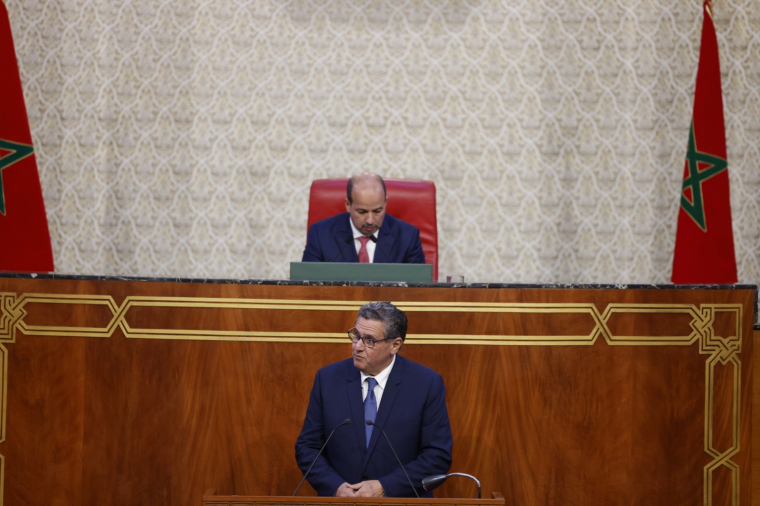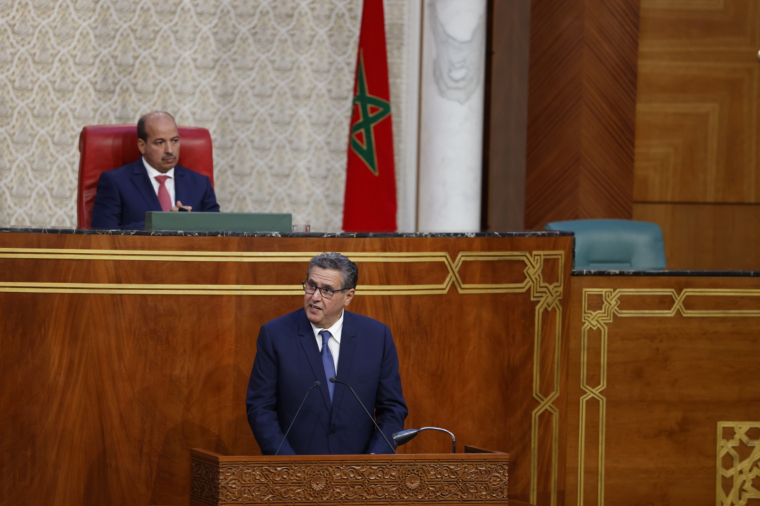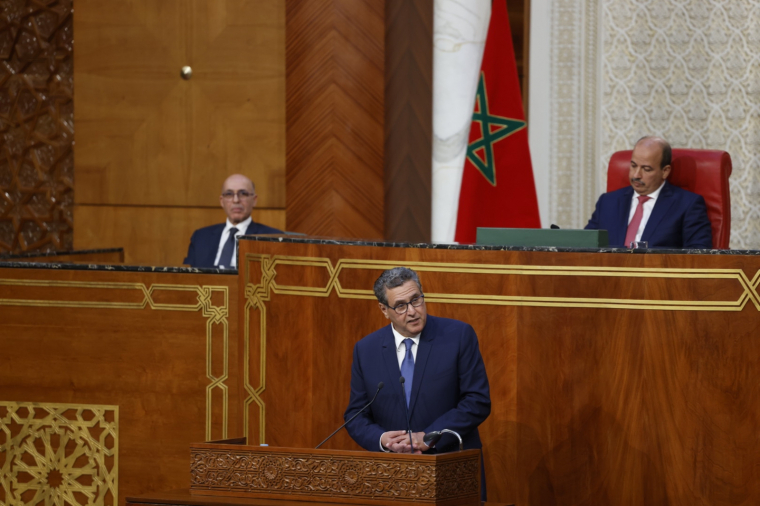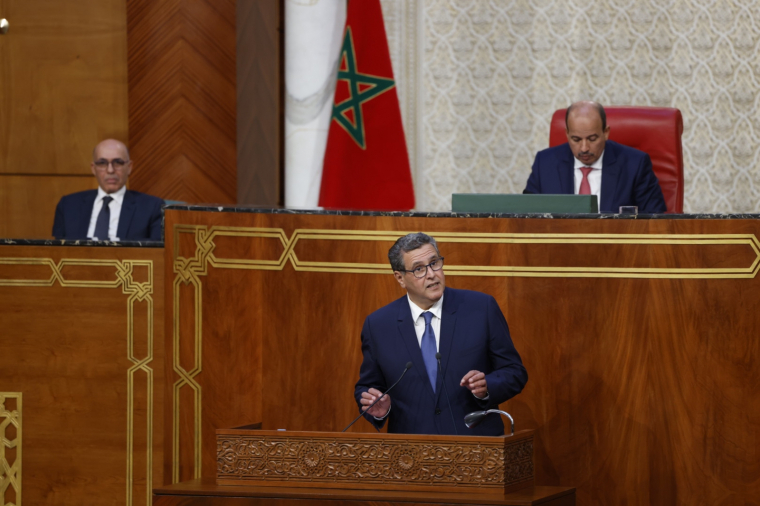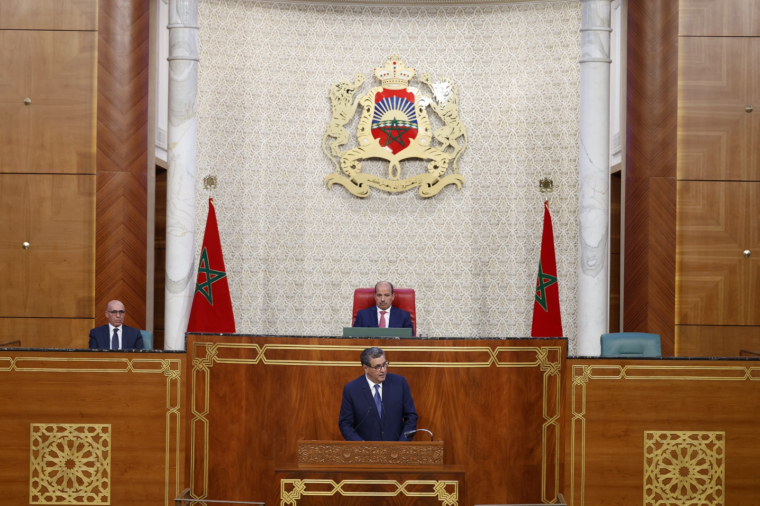The answer of the Head of Government, Mr. Aziz Akhannouch, to the questions of the members of the House of Councillors related to the central question: "Activating health and social coverage workshops in Morocco to consolidate the foundations of the socia
| Question : |
Activating health and social coverage workshops in Morocco to consolidate the foundations of the social state
|
|---|---|
| Session date : | |
| Session : |
Octobre 2022
|
Mr. President of the House of Councillors,
Ladies and Gentlemen, Distinguished Ministers,
Ladies and Gentlemen, Distinguished Councillors,
1. At the outset, I would like to extend my appreciation to all the members of your esteemed Council for accompanying the workshops for the consolidation of the social state, which enjoys the high patronage of His Majesty the King, may God assist him, and I also note your serious keenness to follow the pace of government action in this regard and your choice of the topic: "Activating health and social coverage workshops in Morocco to consolidate the foundations of the social state" as the focus of this constitutional session.
Ladies and Gentlemen,
2. The crisis that the world witnessed during the outbreak of the Covid-19 pandemic was an unprecedented crisis, not in terms of its nature or the magnitude of the social and economic repercussions it caused, and by the grace of God and His power, the public authorities were able to control the management of the remnants of this crisis effectively, and this performance was praised at the international level. This phase was marked by a commendable solidarity dynamic, as well as a strong mobilization of all actors, citizens and the country's living forces to combat the effects of the pandemic. In perfect harmony with The High Instructions of His Majesty the King, may God protect him.
3. However, the severity of these repercussions in our national context is not new today, since the existence of weaknesses and structural fragility in the management patterns of some sectors has been a factor that has exacerbated the difficulties faced by our country, as a result of the accumulated delays in implementing major projects such as the universalization of social protection, the rehabilitation of the health system, the integration of the informal sector, the promotion of territorial justice and the promotion of the national economy.
4. Regardless of the various current social and economic challenges, the government, in accordance with a common sense of collective patriotism, has been keen to consider the crisis as a real opportunity to radically change the patterns of public organization and management prevailing in our country. This transformation requires deep structural reforms that can contribute to providing the conditions for the implementation of the new development model. With the aim of containing, in the medium and long term, all manifestations of the current crises and contributing to the establishment of a more equitable, inclusive, prosperous, and resilient Morocco in the Face fluctuations.
5. The ambition of the "Morocco of Inclusion", which the royal patronage has always attached to a leading and urgent position, and as a proposed mechanism at the heart of the development model to improve the leadership of social programs. It depends on the extent to which our country is able to reduce and mitigate the exacerbation of social inequalities, whether at the level of resource mobilization or the formulation and implementation of strategies, as well as the effectiveness of the social protection system and the strengthening of national ties.
Ladies and Gentlemen,
6. Since the beginning of the current government term, it has been necessary for various efforts to be directed towards taking political decisions that establish a new phase and create an unprecedented development dynamic, in which the citizen is the main concern of the state's social workshops with its various projects and policies.
7. This approach ensures the success of the social protection project in its integrated sense, which equates protection as a human right with a development policy aimed at achieving economic take-off.
8. Thanks to this ambitious and renewed endeavor, which reflects the clarity of the government's conviction and deep awareness of all the questions and major issues of society, and our involvement behind the visionary royal vision. We have begun to reposition the concept of social protection at the heart of public policies, as the cornerstone of any social contract aimed at fairness and dignity of citizens. In addition to being a system of social rights that protect the existence of citizens from the vicissitudes of life, during periods of weakness to which they are exposed in their lives, and to address all risks that could threaten their safety and cohesion.
9. HM the King has already given his high instructions on the occasion of Throne Day 2020 to accelerate the implementation of the various components of the social protection system in our country, considering that "the provision of social protection for all Moroccans, which will remain our main concern, so that we can extend it to all social groups", adding in the same speech that "the time has come, to launch a firm process to universalize social coverage for all Moroccans, within the next five years" (end His Majesty's words). For the government, this was an enlightened platform. To rationalize the actions taken in this framework.
10. This is in line with one of the main recommendations called for in the new development model, aimed at establishing a solid foundation for basic social protection aimed at universal and unified universal health coverage. To enable all citizens to access a basket of basic treatments, as a structured approach that can contribute to achieving important economic growth and strengthen the cohesion of society and the strength of its ties.
Mr. President,
Ladies and Gentlemen, Distinguished Councillors,
11. As is well known, in recent years it has become clear that our country faces major challenges related to poor health coverage, due to structural imbalances in the national health supply, as well as the inadequacy of the compulsory insurance system for illness. This has resulted in a great sense of dissatisfaction among citizens.
12. Therefore, from the first weeks of assuming office, the government, in full respect of the timetable announced by His Majesty the King on the occasion of the 21st anniversary of the glorious Throne Day, has begun to prepare the optimal ground for building a modern social protection system in our country, overcoming the various forms of fragmentation that characterized previous programs and its inability to target the groups that deserve them. Whether in terms of limited health coverage or through weak governance mechanisms and institutional coordination.
13. This enabled us to achieve a very positive outcome during the first year, as the government succeeded in an unprecedented manner in establishing the building blocks of compulsory institutional solidarity that will contribute to the protection of all and the preservation of their rights, as well as facilitating access to health care services in decent conditions, in a way that guarantees equality among all Moroccans, regardless of their material and professional status.
14. We all have the right to be proud of this advanced level of work that has been completed, which is truly a social revolution in dealing with the basic issues of citizens, foremost of which is the consecration of the right to health.
15. In fulfilment of its commitments and before the end of 2022, the government has succeeded in extending compulsory sickness insurance services to enable all Moroccans, on an equal footing, to benefit from unified health coverage services regardless of their social or occupational groups.
16. In numbers, in one year, the total number of insured by the National Social Security Fund went from 7.8 million to more than 23.2 million Moroccan citizens (adding 3.68 million unpaid workers and their beneficiaries and 9.4 million beneficiaries of AMO-TADAMON).
17. In line with the increase in the number of insured people, access to treatment data showed an increase in the number of beneficiaries of the Fund's services:
The number of treatment files for the category of non-wage earners in 2022 amounted to about 642.700 files.
The number of AMO-TADAMON treatment files for the month of December alone exceeded 53,400, in addition to 582,524 receptions in public hospitals (costing more than 233 million dirhams).
18. In order to consolidate these unprecedented achievements and ensure their sustainability, and in an effort to coordinate the work of all stakeholders concerned with the universalization of compulsory sickness insurance, the Government has been keen to develop aspects related to the management and governance of social security bodies, as well as to take measures of a legislative, regulatory, financial and institutional nature to ensure the success of this process, taking into account the structural balance between resources and contributions on the one hand, and expenditures and services provided on the other, in accordance with the legal architecture included in Framework Law No. 21-09 on protection. Social .
19. In this regard, the efforts made by various government departments and their institutional partners must be noted. At the level of leadership and implementation of the components of the project or in terms of its legislative and regulatory determinants.
20. At the leadership level of this structured project, a ministerial and technical committee have been established to ensure the monitoring of the project and the proper implementation of its various components. Thus, I have personally been keen to hold monthly meetings of the inter-ministerial committee to closely monitor the progress of this project, ensure the establishment of harmonious institutional communication and mobilize all the necessary frameworks, means and mechanisms, by mobilizing the various actors concerned and ensuring their full readiness to participate in the success of this workshop.
21. While the Technical Committee held a series of thematic meetings (more than 30 meetings) in order to track the activation of all points of a technical and practical nature to circulate and implement these workshops in good conditions.
22. The various ministerial sectors concerned have also been engaged in the integration of professional groups and families concerned. This government effort was characterized by the mobilization of various administrative and technical departments, by working to create specialized central and regional departments, with the aim of accompanying and facilitating the necessary logistical supports.
23. At the level of legislative and regulatory support, the government was able to change and supplement the law as a code of health coverage and produce 29 implementing decrees according to an initiative-taking and controlled approach, as a basic entry point for the creation of a unified system of compulsory sickness insurance. This has contributed to enabling a group of new categories of professionals, independent workers and non-wage earners who practice private activity to access health coverage services, insure them and their families from various health risks and enhance their practical and professional stability in the future.
24. In addition to the government's success in achieving a qualitative leap for the benefit of 4 million needy families registered in the Ramed medical assistance system and working to integrate them automatically into the compulsory basic sickness insurance system, starting last December. In order to ensure the preservation of their hospital gains in public health institutions, and to enhance their access to the same services and the basket of treatments that benefit private sector employees and public sector employees.
25. In order to address the various imbalances experienced in previous periods, due to the absence of effective technical governance systems for compulsory health coverage, the National Social Security Fund (CNSS) has been mobilized to carry out the necessary reviews of its various administrative structures and to modernize its type of interventions, as the intermediary body charged with receiving the files of new participants and keeping pace with all the basic stages of this workshop.
26. The administrative structure of this institution has been strengthened and its human resources have been rehabilitated, through the creation of a new directorate concerned with "Health Affairs", whose mission is to strengthen the Fund's tasks, manage medical risks, and develop national and international partnerships. In order to qualify it to provide quality services for the benefit of beneficiaries.
27. In order to improve the quality of its interventions, work has also been done to establish a new communication approach to improve the conditions of reception of dependents, based on sensitizing citizens and professional bodies to the importance of this new social workshop and its main components, in addition to expanding its territorial representation and concluding partnership agreements with institutions and points of proximity, and ensuring the financial balance of the system in the medium and long term.
28. It is also an occasion to take a closer look at the great work supervised by the services of the National Social Security Fund, thanks to the efforts made, the Fund has been able to:
Enhancing the proportion of human resources by recruiting more than 1,400 additional positions during the past year.
Establishment of a new plan for the basic training of administrative staff.
Creation of a center for the processing files of non-wage workers.
Establishing partnerships with proximity and mediation institutions that will be responsible for identifying categories of unpaid workers and transferring their personal data to the CNSS.
the opening of some 47 new proximity agencies, and the launch of 45 mobile agencies.
Creation of 8,000 contact points for the registration of new unpaid workers.
Creation of 2,000 contact points for receiving compulsory sickness insurance files.
Creation of 4,000 proximity agencies for the payment of contributions
.. In addition to improving the conditions of accessibility and the performance of administrative services to achieve effective support for the success of this royal workshop.
Ladies and Gentlemen,
29. Our firm conviction in establishing the necessary conditions to shape a new era of health coverage for all Moroccans is matched only by our tireless keenness to install strategic approaches to ensure its financial sustainability and to control social targeting channels with the required efficiency.
30. With regard to the conditions of financial sustainability, it must be emphasized in this context that the expansion of social protection for workers is subject to tight monitoring of the mandatory enrollment of employees as well as non-wage earners in the National Social Security Fund, with the obligation to accompany employers to pay wage earners' benefits on time and to take restraining measures when necessary.
31. Let me recall here that the effectiveness and continuity of this qualitative transformation, the fruits of which we share today for the benefit of our children, our families, and the future of the younger generations, requires ensuring that contributions are compulsory to pay on time as an insurance system based on the "income criterion". The new categories covered by its provisions are obliged to perform their solidarity duties as defined by law to ensure access to the medical care services it provides, as a fair mechanism to embody the principles of social responsibility and national solidarity.
32. Perhaps it is this innovative approach that enabled us to launch the AMO-Tadamon program by paying the contributions of those who are unable to pay them, to ensure their access to health insurance and benefit from the same basket of treatments as wage insurers, while retaining free public health sector services.
33. Today, it is inconceivable that the State should continue to bear the expenses of health services for many professional activities and liberal professions, as long as it is able to contribute and perform its solidarity duties. This would weaken the frequency of targeting low-income families and prevent equitable social equity.
34. On the other hand, and to ensure improved governance and profitability of the various social support programs, the government has embarked on activating the social targeting system in all prefectures and regions of the Kingdom of Morocco, with the aim of diversifying and expanding mechanisms to support vulnerable groups, as the government has begun implementing records related to targeting, through the implementation of the contents of Law No. 72.18, which aims to establish a national system for registering families and individuals wishing to benefit from social support programs supervised by public administrations, territorial collectivities and public bodies.
35. This new trend in the management of support programs for low-income families comes in implementation of the High Royal Instructions, which urged the urgent need to restructure the social supply of support programs, through a real reform of the social systems and programs currently adopted. In order to establish a new path of social work that is centered on quality, through more rigorous programming, mainstreaming tracking, and impact evaluation procedures, and stimulating innovation and results.
36. Registering in the National Population Register (RNP) to obtain their "digital civil and social identifier" is a necessary step to register later in the Unified Social Registry (RSU) to calculate the socio-economic index of households, which is adopted to identify individuals and families who are eligible and willing to benefit from the various support programs provided by the state in a transparent manner, foremost of which is in the future "AMO-Tadamon" and family allowances that we are working to activate starting from this year.
37. Compliance with these new administrative procedures will enhance collective involvement in the success of these workshops, and for this purpose the State has allocated services at the disposal of citizens that are keen to provide them with information and accompany them during all procedural stages.
38. Allow me here to commend the tremendous work supervised by the governors, workers and men of authority, and for their dedication and field efforts, and their tireless keenness to ensure the convergence of interventions at the territorial level, while ensuring that citizens and families are provided with the necessary information and that these workshops are carried out in the best conditions and as soon as possible.
Ladies and Gentlemen,
39. Providing major entrances to win the challenges of universalizing social protection in our country will not have a real impact on the field without a hospital structure capable of keeping pace with this social transformation.
40. This coincides with one of the strategic choices of the government, which aims to create an equal health framework throughout the national territory, to ensure sustainable health care for all against diseases and health risks of all kinds. Rectifying structural backwardness in this area, especially with regard to hospital structures and health frameworks and developing capacities for the production of medicines, vaccines, and essential medical supplies.
41. Despite the successive developments in the health field in Morocco in recent years, it continues to suffer from structural problems, the prominent title of which is the difficulty of accessing treatments and health services that do not meet needs and expectations.
42. The most important manifestations of these imbalances are the poor equipping of public medical institutions and the high cost of medicines and treatment in private medical institutions compared to the purchasing power of the middle and needy classes. This is in addition to the inability of the health system at the regional level and the inability of many bodies to take care of patients, due to the inequitable distribution of human and material resources throughout the national territory.
43. Therefore, it was necessary for the government efforts to focus on developing a new approach to the governance and rehabilitation of health sector services, as one of the major foundations that structure its contract with citizens by seeking to reconsider the course of basic treatments and bring about a profound transformation in the quality of medical services provided.
44. In implementation of the High Royal Instructions in this regard, the current government is leading innovative reform workshops for the sector to be at the level of workshops for the universalization of compulsory sickness insurance and subsequent social support programs, the main components of which are based on the contents of the law - the framework on the national health system, which was presented to the attention of His Majesty the King, may God assist him, and approved by both houses of parliament.
45. In this context, the government has paid full attention to this vital sector by achieving an effective response, mobilizing important financial resources, and correcting its budget choices accurately and proactively. Through the gradual increase of the health budget in the first and second year of its mandate, reaching 23 billion and 551 million dirhams in 2022, an increase of three billion and 741 million dirhams compared to 2021. This was strengthened by the 2023 Finance Law to reach 28 billion dirhams, an increase of 4.6 billion dirhams compared to last year. In addition, approximately 9.5 billion dirhams will be allocated to support 4 million families who will benefit from AMO-Tadamon services, to ensure their access to hospital institutions like other beneficiaries of compulsory health coverage.
46. It should be noted that the components of this approach include 4 major cranes and 11 pivotal measures, aimed at strengthening this system to respond to various challenges and ensure the success of the major projects in which Morocco has engaged.
47. The first pillar of this reform is aimed at adopting a new governance aimed at strengthening the mechanisms of legalization, controlling the work of actors, strengthening hospital governance and territorial planning for the health offer, at all strategic, central, and territorial levels, through:
Creation of the High Commission of Health to strengthen the technical supervision of compulsory sickness insurance, evaluate the quality of services of health institutions in the public and private sectors and give an opinion on various public health policies.
Creation of territorial health groups, which will be entrusted with the preparation and implementation of the regional medical program and strengthening mechanisms of cooperation and partnership between the public and private sectors.
Creation of the Agency for Medicines and Health Products and the creation of the Moroccan Agency for Blood and Blood Products.
Review the tasks, functions, and structure of the central administration.
48. The second pillar seeks to value human resources by creating a health function law to stimulate human capital in the public sector, reduce the current shortage of human resources, reform the training system, open up to foreign medical competencies, and motivate Moroccan medical staff living abroad and urge them to return home.
49. With a financial envelope of more than 3 billion dirhams, the government signed a framework-agreement aimed at increasing the number of health professionals from 17.4 per 10,000 inhabitants registered in 2021 to 24 by 2025 and then to 45 by 2030 (for compliance with the World Health Organization standards set at 23 health professionals per 10,000 inhabitants). In addition to doubling workers in the health sector from 68,000 in 2022 to more than 90,000 by 2025, which requires increasing the number of graduates of the faculties of medicine, pharmacy and dentistry twice, and the number of graduates of higher institutes of nursing professions and health technologies three times by 2025, in addition to establishing a new engineering for basic training in the faculties of medicine, pharmacy and dentistry, and the establishment of 3 faculties of medicine and pharmacy and 3 university hospital centers in Errachidia, Beni Mellal and Guelmim. And Dakhla in the future .
50. The third pillar is geared towards the rehabilitation of the health offer, in order to meet the expectations of Moroccans, in order to facilitate access to medical services and raise their quality, and the equitable distribution of hospital services throughout the national territory, through the reform of primary health care institutions and the rehabilitation of hospitals, then the establishment of the mandatory respect for the course of treatments, and the creation of a system for the accreditation of health institutions.
51. The fourth pillar is related to the digitization of the national health system, through the creation of an integrated information system to collect, process and exploit all basic information related to the health system. This is in line with the keenness to collect the various services of the treatment path for citizens in the public and private sectors and improve the mechanisms for tracking and processing them.
52. In conclusion, I would like to assure your esteemed institution, and through all the various components of national public opinion, that the consolidation of democratic and developmental progress in our country is an essential entry point for the transformation of the national economy and the promotion of dignity and social justice. It will not be possible without continuing to make the necessary sacrifices, demonstrating a spirit of creativity and innovation, and achieving the responsible collective mobilization of all members of Moroccan society.
53. What is certain today is that the Moroccan reform model under the wise leadership of His Majesty the King, may God assist him, has indeed shown exceptional radiance, with a clear recognition of the international and regional institutions, as thanks to the strength and steadfastness of its choices, it was able to face the challenges of the times and the transitional transformations that most societies are witnessing.
54. In a year full of challenges and challenges, our country has demonstrated the effectiveness of its development options and strategic vision, as evidenced by the ability to launch major social and economic reforms without compromising balances or gains in accordance with a renewed reform vision within the framework of the State of institutions.
Peace, mercy, and blessings of God be upon you.





